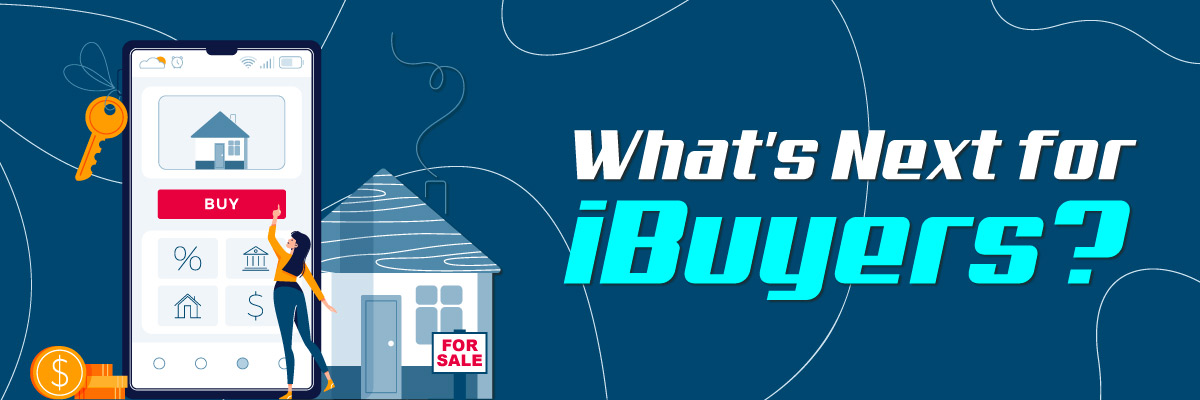What’s Next for iBuying as Zillow Exits the Market?
December 6, 2021

Last month, Zillow reported that it is shutting down its Zillow Offers division and is getting out of the iBuyer business. At the end of the third quarter, Zillow had nearly 9,800 homes in its inventory and was in the process of completing purchases on about 8,200 homes. The company is saying that it will sell off those 18,000 homes over the next six months.
Why is Zillow Closing Down Its iBuyer Business?
Simply put, Zillow was unable to reliably predict local home prices and was unable to purchase and turnover homes at scale. Homes were being sold at a loss in many cases. As a result, the company’s Zillow Offers division lost about $304 million during the third quarter. A statement from Zillow’s CEO Rich Barton said, in part:
“We’ve determined the unpredictability in forecasting home prices far exceeds what we anticipated and continuing to scale Zillow Offers would result in too much earnings and balance-sheet volatility.”
Zillow found it difficult to estimate local home prices, particularly during the fast-paced pandemic housing market. And while, as a tech company, Zillow has a lot of data on properties and on home buyers, they do not know a lot about local neighborhoods and cannot fully evaluate the quality and amenities of individual homes.
Will Zillow’s Move Impact the Housing Market in Virginia?
The short answer is no. Zillow’s iBuying program had been only available in select markets in across the country. The company’s focus had been on local markets in Texas, North Carolina, Nevada, Florida, California, Oregon, and Arizona. According to their website, Zillow Offers was not available in any markets in Virginia.
What’s Next for iBuying?
Zillow’s departure from the iBuying business does not signal an end to the practice of instant offers. Even as it bought more properties, Zillow was not the largest iBuyer in the country. Opendoor is the nation’s largest iBuyer, with more than 100,000 transactions over the past seven years. Opendoor is focused on many of the same markets Zillow was, but has a broader reach, including a presence in the Richmond and Washington DC area markets. Offerpad is now the second largest iBuyer in the country, and there are a number of smaller (but expanding) players, including Redfin, Perch, Knock, and others.
Still, iBuyers make up a tiny share of all home sales transactions. In the 3rd quarter of 2021, before Zillow’s departure, iBuying hit an all-time share of home sales, accounting for 1.6% of all sales nationally. In some local markets, like Raleigh, NC and Phoenix, AZ, iBuyers accounted for between five and six percent of sales.
While technology-driven instant offers likely will remain a very small slice of the real estate market, the iBuying model is not going away simply because Zillow has left the room. Both Opendoor and Offerpad have said they are planning on ramping up their iBuying programs. Conventional brokerages are also opening up their own iBuying services.
Zillow’s exit has highlighted some of the major challenges associated with iBuyer programs and the future is still uncertain. One analyst has predicted that iBuyers could reach 5% market share by 2025 and 18% market share by 2030. However, the lack of on-the-ground presence and limited real-time local market data are ongoing challenges for iBuyers. Most industry watchers say that in the future, iBuyer programs will continue to appeal to a small set of home buyers and sellers.
Click here to send any comments or questions about this piece to Virginia REALTORS® Chief Economist Lisa Sturtevant, PhD.
You might also like…
RESPA & Joint Ventures: What Is Allowed?
By Laura M. Murray - March 6, 2023
We have heard reports that state Attorneys General may be taking an increased interest in certain joint venture arrangements between real estate licensees and settlement companies. Agents may… Read More
DPOR Update: Death or Disability of a Broker
By Laura M. Murray - December 5, 2022
In the 2022 Session, the General Assembly passed a law updating what happens in the event of the death or disability of a sole proprietor or sole broker… Read More
What Do Federal Reserve Rate Hikes Mean for the Housing Market and for Your Business?
By Dr. Lisa Sturtevant - April 4, 2022
In March, the Federal Reserve raised the short-term federal funds rate by 0.25 percentage points. This rate hike was the first time the Fed has raised rates since… Read More